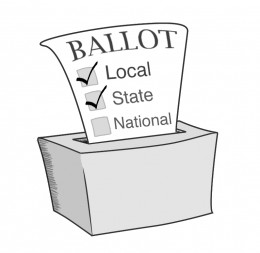
With the presidential election just over a month away, Binghamton University’s campus is teeming with organizations and individuals urging students to vote. Getting college students to vote is challenging, though admirable, on any college campus. Now more than ever, students view their votes as insignificant and regularly fail to show up at the polls.
Any movement that aims to reverse growing political apathy among our generation deserves plaudits. That said, the near-exclusive focus voter registration drives place on presidential elections is misplaced, if understandable.
Of course the election matters, and it’s either cynical or an excuse for apathy to say that one’s vote just doesn’t matter. At the same time, for the majority of BU students —that is, New York residents — their vote in the presidential elections actually won’t matter. This is a blue state and that fact isn’t likely to change anytime soon.
Where our vote holds the greatest weight is at elections a little closer to home — right at home, in fact.
Elections for county executive, county legislature, state assembly and the local district’s U.S. congressman will all also take place on Nov. 6. The outcomes of these elections can have a major impact on our lives, especially as students of a state school, and student votes — and opinions — are significantly more likely to count in these races.
Students are, as a demographic, not likely to show up at the ballots in overwhelming numbers — in last year’s elections only about 30 students turned out to vote on campus — and politicians know that. Why should candidates pander to students if students aren’t going to vote for them anyway?
But to write off negligible turnout merely as impassivity would be a cop-out. The fault lies both with students and with local politicians.
There are, in fact, ample numbers of politically involved students. The problem is that, rather than focusing on the importance of elections writ large or the importance of local elections specifically, they mobilize to register and educate voters only once national election season rolls around.
Educating voters about presidential candidates is a bit like Alcohol-Wise: it may change a few minds, but by and large students will leave with their minds unchanged and will do exactly what they were going to do before, whether that’s not drinking a glass of water between drinks or voting Republican. And even though their vote really doesn’t count, students are already generally more likely to vote in presidential elections.
Local elections, though, matter far more: the policies representatives enact could have a significant impact on students’ everyday lives. This past year, for example, funding for the B.C. Transit buses, which travel from surrounding areas and to campus, was slashed, resulting in fewer buses running to fewer areas.
The reduction in buses has had an immediate adverse impact on students. Having to wait an extra 45 minutes for a bus or having no bus routes nearby is a major inconvenience. But there is good news and bad news. These cuts were made by the Broome County Executive, and while students shouldn’t have allowed a representative with no interest in students to be elected, elections are coming up once again.
Student groups dedicated to politics and voting should thus turn more of their focus and energy to educating the public on the importance of local elections. If students realized that a vote could mean more buses, more local support and more state money, surely they’d turn out to vote in more significant numbers — not that 30 is hard to top.
At the same time, local politicians should realize the latent demographic at their feet. They are regional representatives, and were they to work to represent the 15,000 students here, they’d have a corresponding number of extra votes in their next election.
Students aren’t a hard group to please. We want cheaper services, better public transport, safer streets and lower rent. All these are things that local representatives have the potential to change. If they show that they care, students will show that they care too — they just need to know that what they care about actually matters.


